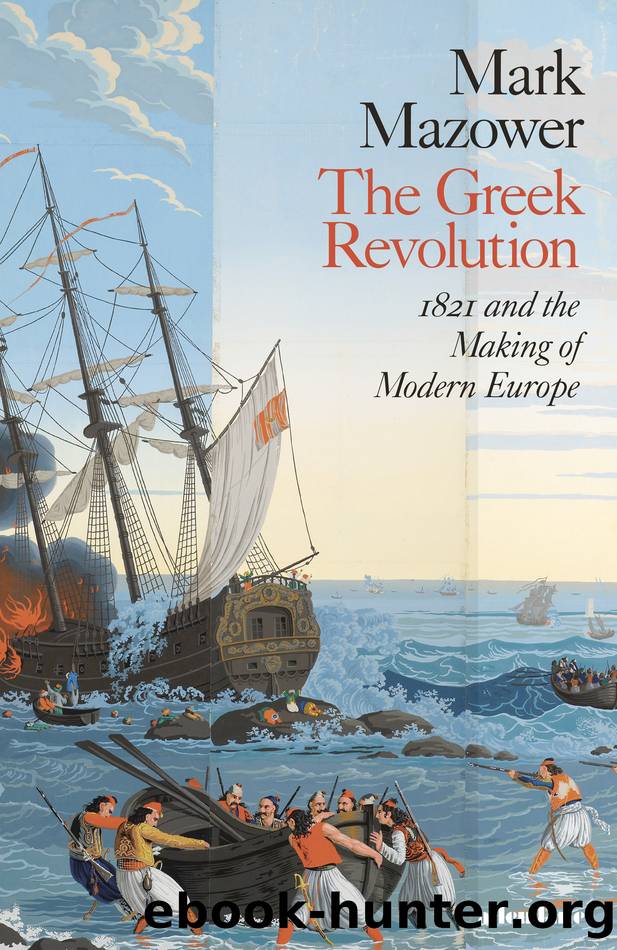The Greek Revolution by Mark Mazower

Author:Mark Mazower [Mazower, Mark]
Language: eng
Format: epub
ISBN: 9780141978758
Publisher: Penguin Books Ltd
Published: 2021-11-04T00:00:00+00:00
Sève had been born near Lyon and entered the navy as a boy: the Napoleonic Wars had provided his schooling. Cannoneer, infantryman, cavalry instructor, he had seen action everywhere from the Azores to Russia to the Battle of Trafalgar. Twice his horse had been shot from under him; he had been wounded by a lance; he had, to his eternal regret, killed a man in a duel. In 1815 he was a tough, blunt, courageous cavalry lieutenant who fought at the Battle of Waterloo and was devoted to his emperor; five years later, with Napoleon in exile, Sève was yet another struggling former officer with no chance of employment in the armies of Louis XVIII. In debt, and unfitted for a life in commerce, he pondered employment in the Persian army before making his way to Egypt where he met the young Frenchman Coste, who helped him to enter the pashaâs service.13
Mehmed Ali read the letter of recommendation that Sève brought from the Comte de Ségur, listened to the remarkable tale of his wartime experiences across the battlefields of Europe, and evidently saw in his supplicant a man of energy, ability and audacity mirroring his own. Both were consummate organizers and men of action; both were conscious of their lack of formal schooling â Mehmed Ali was illiterate for most of his life â and they shared too a passionate admiration for the French emperor whose death in May 1821 they mourned. Mehmed Ali first placed Sève in charge of artillery workshops on the citadel in Cairo and then approved his proposal to create several new army regiments along French lines. Ibrahim, who would become their commanding officer, trained as a recruit and it is said that his rough treatment by Sève, who was no diplomat, was the source of an enduring tension between them. If so, it scarcely impeded their collaboration. Mehmed Ali, Ibrahim and Sève worked closely, harmoniously and effectively together for twenty years in a series of remarkable campaigns which eventually succeeded in wresting international recognition for Mehmed Aliâs dynasty and turning Egypt into a major regional power.14
Unusually among the pashaâs European advisers, Sève converted to Islam â probably shortly before his departure for the Morea â and was henceforth known as Soliman, rising through the ranks to become a pasha. âAl-Faransawiâ (âthe Frenchmanâ) became a national figure whose great-granddaughter would marry one of Mehmed Aliâs descendants and become queen of Egypt before dying in a Los Angeles suburb. Sèveâs tomb and a statue of him survive in Cairo to this day. The honours were merited: it was, after all, his six new infantry regiments, levied and trained with merciless brutality from among the fellahin of Upper Egypt, that allowed Mehmed Ali to emancipate himself from reliance upon the Albanian irregulars and janissaries who had proved so untrustworthy in the past. A test of the new army came with a large peasant uprising in Upper Egypt in the spring of 1824; it was easily crushed. With that distraction behind them, Sève and Ibrahim began their preparations for the Morea.
Download
This site does not store any files on its server. We only index and link to content provided by other sites. Please contact the content providers to delete copyright contents if any and email us, we'll remove relevant links or contents immediately.
Harry Potter and the Goblet Of Fire by J.K. Rowling(3053)
Never by Ken Follett(2890)
Shadow of Night by Deborah Harkness(2720)
Ogilvy on Advertising by David Ogilvy(2685)
Zero to IPO: Over $1 Trillion of Actionable Advice from the World's Most Successful Entrepreneurs by Frederic Kerrest(2409)
The Man Who Died Twice by Richard Osman(2301)
Machine Learning at Scale with H2O by Gregory Keys | David Whiting(2295)
Book of Life by Deborah Harkness(2265)
How Proust Can Change Your Life by Alain De Botton(2264)
My Brilliant Friend by Elena Ferrante(2226)
0041152001443424520 .pdf by Unknown(2222)
The Tipping Point by Malcolm Gladwell(2206)
How to Pay Zero Taxes, 2018 by Jeff A. Schnepper(2102)
Will by Will Smith(2045)
Purple Hibiscus by Chimamanda Ngozi Adichie(1986)
Hooked: A Dark, Contemporary Romance (Never After Series) by Emily McIntire(1975)
Borders by unknow(1788)
Rationality by Steven Pinker(1768)
Daughter of Smoke and Bone by Laini Taylor(1744)
